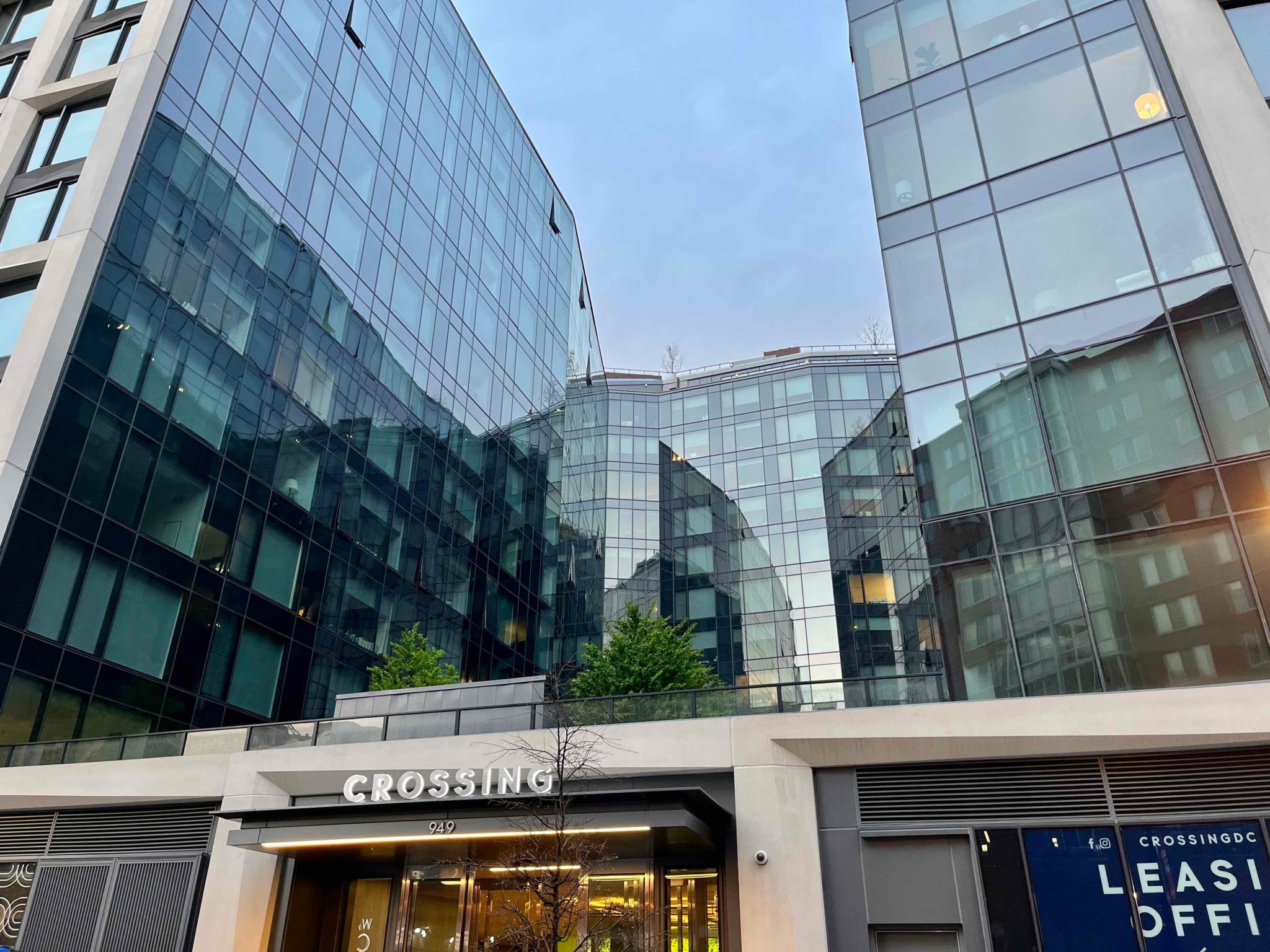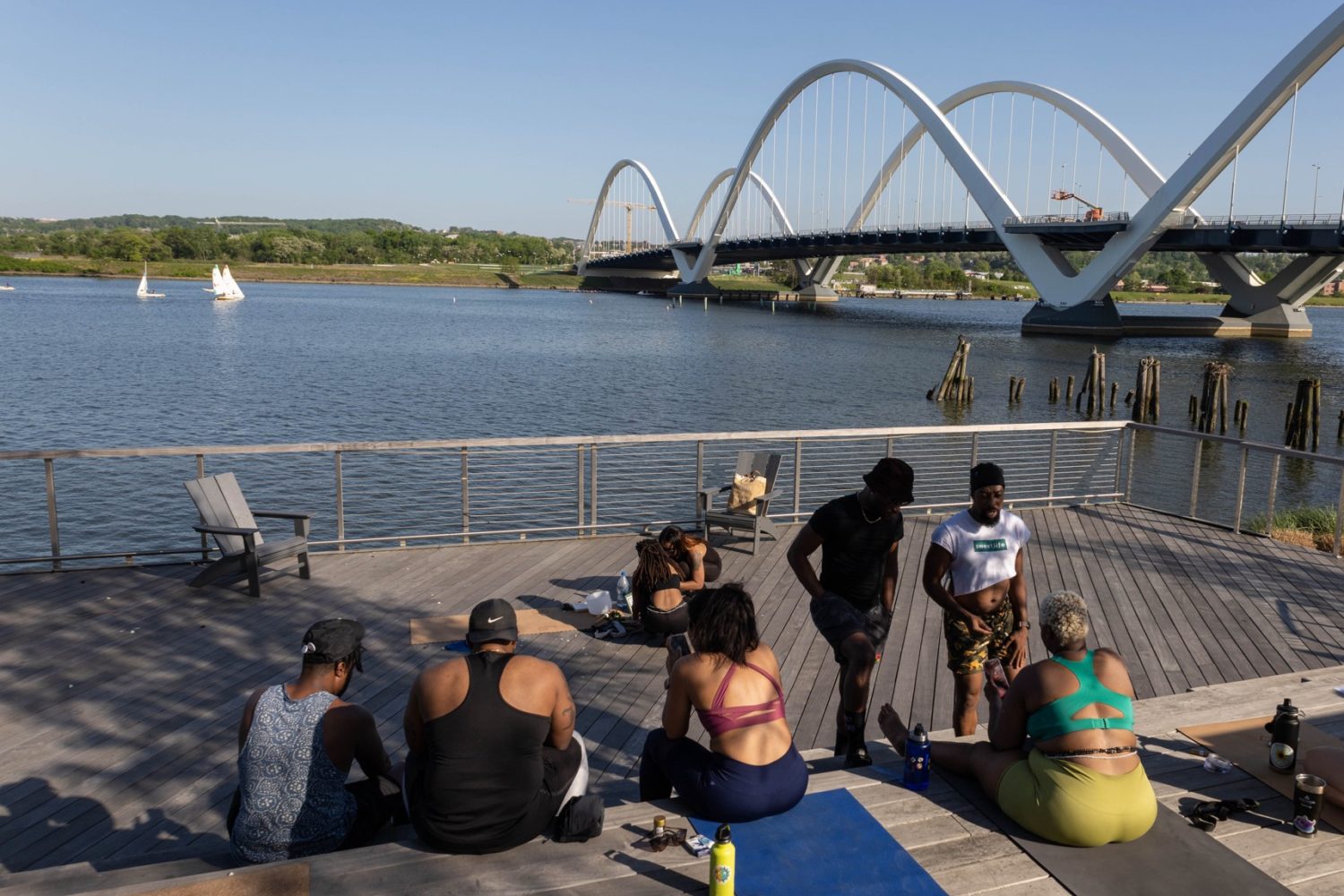In the fall of 2021, a resident of the Navy Yard building Crossing DC attended a party at the apartment of her neighbor, a man named Ari who she knew through friends. “That first time I ever went into his apartment, it was so strange to me,” she recalls, “because he had a huge three-bedroom apartment with no furniture. And I was just like, why would you pay for this as a single guy?” She says Ari claimed that the government was footing the bill, which seemed plausible; most people she knew in their building worked for the government.
Later that night, this resident—who asked to be called Micaela—was sitting on Ari’s couch when her friend ventured into one of the apartment’s back rooms. “My friend comes out wearing, like, I think a gas mask and a bulletproof vest,” she says. He described the room as a “bedroom full of guns and military equipment.” (According to prosecutors, a weapons cache was later found in a search of the apartment.) In retrospect, Micaela sees that “there are things that were weird, like the free three-bedroom apartment and a bedroom full of guns when you live in downtown Washington, DC. But I just thought it was something I didn’t understand because I don’t work in the government.”
Ari turns out to be Arian Taherzadeh, one of two men arrested on Wednesday for allegedly impersonating federal agents. The other is his associate, Haider Ali, also a resident of Crossing. An FBI affidavit alleges that they’ve been pretending to be Department of Homeland Security officials since February 2020, a ruse that helped them get close to “members of federal law enforcement and the defense community.” (The FBI’s documents shed no light on the suspects’ motives or goals.)
To woo these security-minded professionals, the FBI claims that Taherzadeh and Ali dangled an irresistible DC prize: rent-free luxury apartments at Crossing, a new-construction complex with amenities like a yoga room, infinity pool, cold-water-plunge, and sauna. Per the affidavit, Taherzadeh told one Secret Service agent it was fine to crash there without paying because DHS gives Taherzadeh “extra rooms” as part of his “operations.”
William Taliaferro, a federal employee who has lived at Crossing since August, describes the building as the kind of place where you don’t ask too many questions about work. “You talk to people here, you’re like, ‘Hey, what do you do for a living?’ They’re like, ‘I work for the government.’ You just know not to follow up. They’re just not able to tell you because of some legally binding agreement.” Micaela felt this, too. While there was definitely stuff that seemed odd about Ali and Taherzadeh, it never occurred to her to ask more questions: “I’m not going to be able to have a conversation about [their] job at DHS, chances are, because I don’t have a clearance, you know?”
Besides, it seemed to Micaela like everyone at Crossing had government jobs, so “you kind of get desensitized to it.” Meeting neighbors at Crossing, “it’s like, ‘Oh, this girl’s a Secret Service agent,’ and in a past life I would be like, ‘Whoa, that’s insane.’” But “if everybody has a really cool, important job, it eventually makes everybody feel like they’re all the same.”
While their professed occupations didn’t stick out, Taherzadeh and Ali did seem to have an unusual amount of power at Crossing. One resident, who asked to stay anonymous, was accidentally locked out of her apartment one night, so she went down to the concierge desk to ask to be let in. She says that Haider Ali was there chatting with the concierge. After she explained her situation, she recalls that Ali “proceeded to write down a code for me out of nowhere and said that it was the ‘master code’ for the entire building,” which uses an electronic system to access apartments. When she asked how he happened to have such a code, she says he claimed to be “part of the secret police” and then showed her a badge.
The code apparently worked—she says she got right back into her apartment. “At the time, I fully thought he was legitimate,” she says. “Like, he sold it well.” She didn’t reconsider until talking it over with her roommate, which led her to wonder, “if he’s part of a secret police, why would he just whip out a badge and show me it?”
That incident was just part of life at Crossing, where things could sometimes get weird: the adult film that two residents claim was made in the “wellness suite,” or the man who was spotted “walking in off the street and injecting drugs in one of the lobby bathrooms and just kind of meandering about the lobby.” These were both described by a federal employee who asked not to be identified. Before Wednesday, her concerns with her neighbors did not relate to alleged criminality: “There’s always loud parties or just kind of fratty, unacceptable behavior. Somebody, like, urinating off of the roof—this is just kind of commonplace in the building.” (Building management has not responded to requests for comment.)
Now, after the FBI raid, some residents have different concerns—particularly given the allegation, revealed in the affidavit, that the suspects may have been surveilling them. In an interview with the FBI, one of the Secret Service agents allegedly living for free at Crossing claimed that Taherzadeh had “full access to all floors of the apartment and some restricted areas,” which he apparently gained by telling management about his supposed government job. That agent also claimed to have seen Taherzadeh with a list of names and room numbers of the building’s residents. (“Haider was always saying things like [that] he had the ability to do whatever he wants in the building,” Micaela recalls.)
In addition, the affidavit alleges that the suspects told some of their neighbors “that they can access, at any time, the cellular telephones of residents of the apartment complex.” The suspects also may have had some kind of video surveillance set up around the building—two Secret Service agents told the FBI that Taherzadeh had personally shown them footage.
Obviously, this doesn’t sit well in a building full of the kinds of people who can’t discuss their government jobs—especially since many residents currently work from home. “Right now,” Micaela says, “I think the thing that the residents want more than anything is to know that their data was never compromised.”
Residents have been furiously discussing the situation in a private Facebook group called “Crossing DC Residents,” which itself isn’t all that secure. “In fact,” Taliaferro says, “when the raid started, [Taherzadeh and Ali] were still members of the Facebook group. The admin had to kick them out at a certain point, because everyone was obviously commenting on that thread.”
Asked if the building might have been targeted for its high concentration of government workers, one of the federal employees we talked to is circumspect: “I think they could have chosen any building in Navy Yard.” She has friends in other buildings nearby, and those complexes are mostly government, too. “But I will say, our building is also brand new. The units are a little bit more on the expensive side. So if they were trying to, like, bribe the Secret Service, I know they had one of the penthouse units.”
Luxe trappings aside, this resident isn’t sure that Crossing is worth it. “You know, you pay a good amount of money to feel like you’re safe and secure, and I definitely don’t feel that way.”



















